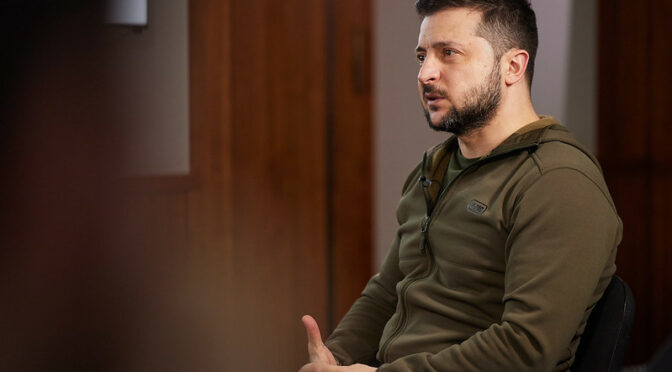Article published in The Daily Telegraph, 16 June 2022. © Richard Kemp
Emmanuel Macron, Olaf Scholz and Mario Draghi all looked very jolly as they took the train to Kyiv. During their visit yesterday, they made all the appropriate noises about backing Ukraine in its fight against Vladimir Putin. But they have played a large part in the country’s increasingly precarious situation. The three biggest economies in the EU have been dragging their heels on supplying arms while continuing to pour billions of euros into Moscow’s war chest by buying its energy. Scholz’s promise of tanks and failure to deliver them and Macron’s plea that Russia shouldn’t be humiliated have underlined Europe’s weakness.
The sluggish Western military response has meant that, in the east, Russia has a 10 to 15-fold advantage in artillery, the most important battle-winner in this campaign. While the Russians are firing 50,000 shells a day, Ukraine is unable to hold its own with plenty of Nato ammunition but hardly any guns to fire it. Despite big talk by the US and UK about sending multiple-launch rocket systems, a potent stand-off weapon that could help redress the balance, only a handful are being supplied against the 300 President Zelensky says he needs.
So as the Russians advance steadily over some of the most fortified terrain in the world, the Ukrainians are falling back in the face of blistering artillery fire, with a casualty rate of up to 800 a day. As other strongpoints have collapsed, the bastion town of Severodonetsk looks set to fall despite hard fighting to defend it. In the south, Ukrainian forces are making limited advances towards Kherson, while the Russians are stiffening their defences and claim to have reactivated the port. It is here we are likely to see the next major Russian offensive, as Putin aims to move west to capture the entire Ukrainian coast and threaten Moldova.
Early assumptions that Ukraine would decisively defeat the Russians are being unwound as Putin pushes forward, seemingly unfazed by the huge loss of life and hardware. But this new reality may not have been fully grasped even in some Western capitals. In a briefing on Tuesday, Colin Kahl, the Pentagon’s defence policy chief, claimed that Putin would not be able to capture a significant proportion of Ukraine, yet 20 per cent of the country is already in his hands. America’s complacent line prevails in Whitehall as well, which takes the extraordinary position that Russia has already been strategically defeated.
That view does not seem to be shared in Beijing. At the start of the war, Xi Jinping tried to look both ways, blaming Nato for provoking Russia while calling for peace. But as the three European leaders headed for Kyiv, Xi was on the phone to Putin, pledging deeper co-operation between their countries. In the most unequivocal declaration of support for Putin since the war started, Xi committed China to backing Russia on issues such as sovereignty and security.
This must have come as a blow to Washington after months of efforts to get China to distance itself from Russia. Only hours before the call, the Pentagon’s Kahl had suggested that Beijing was unsettled by the strength of Western action over Ukraine. If that was the case early on, it has been undermined by Putin’s recent successes and Nato’s failure to give Ukraine the military assistance it needs. The Pentagon view was echoed in comments by Ben Wallace, the Defence Secretary, who said: ‘If Russia thought it was going to paint a story of splits and failures, it has actually failed and China will notice that.’
What China has noticed is a lack of Western resolve over Ukraine – the same thing it noticed over Afghanistan last year. If Putin is allowed to succeed in Ukraine, Xi will surely be further emboldened to move on Taiwan with the belief that the West might well make a lot of noise but lacks the will for meaningful intervention.
Just months ago, we were talking about the dawn of a new, confident age for democracies, as we told ourselves the West had finally united to stand up to aggression. Now we’re seeing the rise of a new axis of evil that threatens us everywhere. This danger is increased by complacency in Nato, as well as by irresponsible messages of war-weariness from European leaders who ought to know better.

